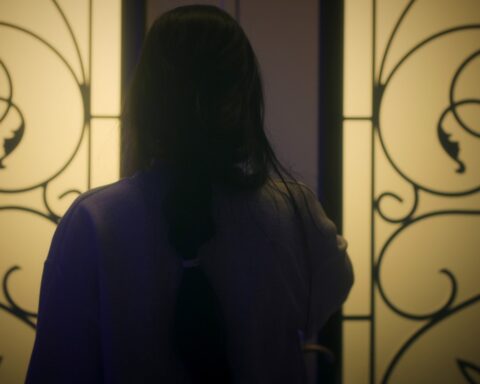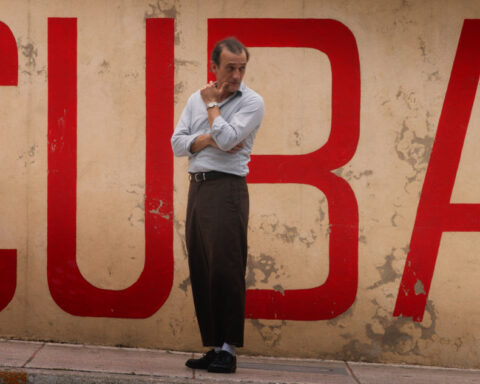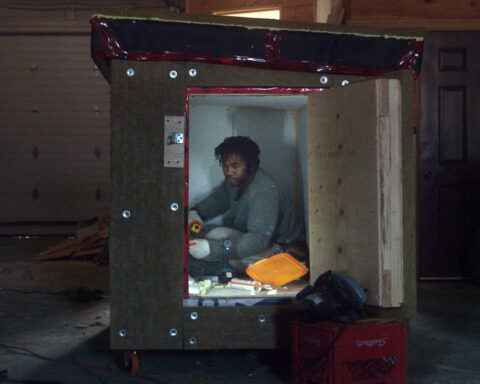MS Slavic 7
(Canada, 64 min.)
Dir. Sofia Bohdanowicz, Deragh Campbell
Audrey Benac’s adventures in the archives continue with MS Slavic 7. After being thwarted by limited user time and bad egg sandwiches in Veslemøy’s Song, Benac is back browsing through the stacks. Played again by Deragh Campbell, the character explores another aspect of writer/director Sofia Bohdanowicz’s family history.
It’s not Bohdanowicz’s first time twisting her family’s past into fiction. The filmmaker previously loaned her grandmother, Joan Benac, and her grandfather’s music teacher Kathleen Parlow, to Audrey’s soul-searching in Never Eat Alone and Veslemøy’s Song, respectively. One can’t help but enjoy the film as her response to some relative’s complaint of, “Stop sharing our lives!” (One can only imagine such complaints, if any.)
The nuggets of the Bohdanowicz family archive that fuel MS Slavic 7 are the copious personal letters written by her late great-grandmother Zofia Bohdanowiczowa, a poet, to writer Józef Wittlin when they arrived in North America. (The title refers to the collection’s call number at Harvard’s Houghton Library.) Audrey, after all, is Bohdanowicz’s surrogate and after so many films together, they’re on the same brainwave. The film uses epistolary history to spur deep thoughts from Audrey/Campbell as MS Slavic 7 shapes a tightly crafted essay on art, archives, and adulting.
The film is admittedly more aesthetically restrained than Bohdanowicz’s previous works after the black-and-white odyssey of Veslemøy and striking 16mm Maison du Bonheur. However, despite the drabness of digital video and dire colour patterns of library walls, there’s a lot more at work in MS Slavic 7 than initially meets the eye. The film is scripted tautly and methodically like an academic treatise. It deftly reveals itself as a pattern takes shape scene upon scene. Audrey goes to the archives, she considers her work, then goes to a family party, and struggles with her hotel room’s instant coffee maker. Repeat.
While Slavic barely clocks in over an hour, there’s a dense and methodical rhythm to its academic cadence. The film sees Audrey visit the Houghton archives, which are TIFF’s Film Reference Library and Toronto’s Polish Consulate as stand-ins for Harvard’s campus, on three separate visits. Each one has a similar ring to Veslemøy’s Song as Audrey visits the archive in search of a rare find, battles a prickly librarian to obtain it, and savours a trip through stories passed.
Where Audrey stands-in for the director, the character also serves as the conduit through which the audience accesses the materials. Each segment in the archive features lengthy processes of poring over great-grandma Bohdanowiczowa’s letters. The film lets a viewer understand the words of the Polish letters, which appear as subtitles, and taste the details of family history that bring each correspondence to life, like Zofia’s neatly scripted handwriting, the creases of time on the paper, and the postage stamps that mark their travels. For anyone who really loves digging through the stacks and embracing the tactility of history, MS Slavic 7 is a geeky thrill.
But it’s also quite brilliant in the questions it raises. The film doesn’t give audiences too much time to mull the materials over, for each session in the reading room quickly cuts to a breathless monologue by Campbell as Audrey interprets the letters while sharing a beer with an unseen translator. When Audrey visits with her aunt, who seems to have usurped the young woman’s rightful authority over the archives as executor of her grandmother’s literary estate, MS Slavic 7 challenges questions of ownership that inevitably arise with such materials.
Similarly, Audrey’s (valid) defensiveness over her research underscores the conundrum of conveying to the powers that be the legitimacy of such inquiries. Audrey’s aunt more than once observes the young woman’s inability to profit from her work. The elder Etobicoke-dwelling Benac only views their grandma’s history, and Audrey’s research, by its monetary worth. History, be is collective or personal, has value. Audrey’s aunt trivialises the work that her niece—and, let’s admit, most people in their arts—pursue out of passion.
But Audrey still has a long way to go and Campbell relishes the complexity of her inquisitive academic who’s still a girl at heart. (The film’s final shot is a droll snapshot of Audrey’s arrested development.) Her performance is a polar opposite from her charged turn in this year’s Anne at 13,000 ft, and remarkable in its natural subtlety. Campbell, who receives a co-director credit in MS Slavic 7, really gets into her character’s skin and headspace. Audrey’s free-flowing musings at the pub, all improvised, see her shape and articulate her relationship to her great-grandmother’s past, as well as her connection to the translator who sits on our side of the frame. MS Slavic 7 lets the audience observe Audrey as she evolves in real time. Not quite grown up by the end of this film, but perhaps she will be in the next one.
Her monologues, like Zofia’s letters, give audiences impressions of a person that they can piece together to form a whole. Where Audrey get a beau and a pint to consider her research, the film invites audiences to enjoy their own academic nattering as they get their chance to interpret the young woman’s life in the film’s post-screening debate.
MS Slavic 7 opens in Toronto at TIFF Lightbox on Oct. 11.











